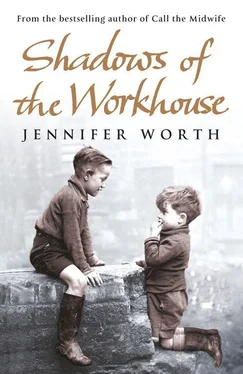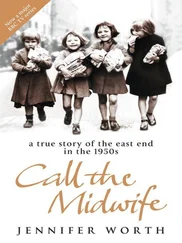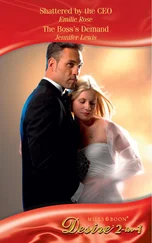Jennifer Worth - Shadows Of The Workhouse - The Drama Of Life In Postwar London
Здесь есть возможность читать онлайн «Jennifer Worth - Shadows Of The Workhouse - The Drama Of Life In Postwar London» весь текст электронной книги совершенно бесплатно (целиком полную версию без сокращений). В некоторых случаях можно слушать аудио, скачать через торрент в формате fb2 и присутствует краткое содержание. Жанр: Биографии и Мемуары, на английском языке. Описание произведения, (предисловие) а так же отзывы посетителей доступны на портале библиотеки ЛибКат.
- Название:Shadows Of The Workhouse: The Drama Of Life In Postwar London
- Автор:
- Жанр:
- Год:неизвестен
- ISBN:нет данных
- Рейтинг книги:5 / 5. Голосов: 1
-
Избранное:Добавить в избранное
- Отзывы:
-
Ваша оценка:
- 100
- 1
- 2
- 3
- 4
- 5
Shadows Of The Workhouse: The Drama Of Life In Postwar London: краткое содержание, описание и аннотация
Предлагаем к чтению аннотацию, описание, краткое содержание или предисловие (зависит от того, что написал сам автор книги «Shadows Of The Workhouse: The Drama Of Life In Postwar London»). Если вы не нашли необходимую информацию о книге — напишите в комментариях, мы постараемся отыскать её.
Shadows Of The Workhouse: The Drama Of Life In Postwar London — читать онлайн бесплатно полную книгу (весь текст) целиком
Ниже представлен текст книги, разбитый по страницам. Система сохранения места последней прочитанной страницы, позволяет с удобством читать онлайн бесплатно книгу «Shadows Of The Workhouse: The Drama Of Life In Postwar London», без необходимости каждый раз заново искать на чём Вы остановились. Поставьте закладку, и сможете в любой момент перейти на страницу, на которой закончили чтение.
Интервал:
Закладка:
She said, “He hardly even talks about the war, he bottles it up. Occasionally I can get him to talk about it, and I think it helps. But he still even now, thirty years afterwards, has dreadful nightmares. He screams and thrashes around the bed, and shouts to people in his dreams.”
Having heard Mr Collett’s descriptions of trench warfare I began, for the first time, to understand my Uncle Maurice, and my aunt’s saintly devotion.
One day she told me the most dreadful story of all. Her husband had been ordered to join a firing squad of ten men to shoot one of their companions who had deserted and been captured. The victim was a boy of nineteen who had been so terrified by the noise of guns and the death happening all around him that his mind had snapped and he had run away screaming. He was quickly arrested, for he had not managed to stumble more than half a mile, then was court-martialled, and sentenced to death for desertion. All the men knew the boy and each one hoped and prayed he would not be ordered to join the firing squad. Ten men were selected and ordered to shoot the boy in cold blood, and my uncle was one of them.
I told the story to Mr Collett. For several moments he said not a word, but was busy cleaning out his pipe with a murderous-looking weapon, scraping and gouging the nicotine and tar from the encrusted bowl of his old friend. Then he blew hard down the stem and bits of black stuff flew into the air.
“That’s better,” he muttered “no wonder it wouldn’t draw.” Then he said, “Fill my glass, will you dear?”
I sloshed more brandy in, not knowing how strong it was. He took a sip and rolled it on his tongue, then said: “That is a dreadful story. It will remain with your uncle for the rest of his life. War brutalises a man. It is not surprising he was moody and violent. But you must remember two things: running away from battle has always been punishable by death. Military discipline must be harsh, or every soldier would run away; and secondly in a firing squad of ten men only one held a rifle with live ammunition – nine held blanks. So every man had a nine out of ten chance of not being responsible for the death of his colleague.
“I don’t know what to think. I suppose it’s as you say – military discipline must be harsh – but it’s dreadful all the same. I find it almost unfathomable.”
“Of course you do, my dear, you are in a profession that is devoted to caring for life, not destroying it. ‘War is hell’ – General William Sherman said that about the American Civil War a hundred years ago. It always has been hell and it always will be.”
“My grandfather told me that his uncles had been in the Crimean Wars and never came back. The family never knew what happened.”
“No they wouldn’t. The common soldier was completely expendable, not even named. Did you know that after the battle of Sebastopol the bones of the dead were collected up in sacks and shipped back to Britain to be ground down into fertilizers that was sold to farmers for a profit.”
“That can’t be true.”
“It is true. Perfectly true.”
“It’s disgusting! I think I’ll try a shot of your brandy.”
“Be careful. It’s strong stuff.”
“I’m not worried, I can take it.” I boasted.
I poured some, and took a gulp as I had seen him do. It didn’t just take the roof off my mouth; it set fire to my throat and gullet and windpipe. I started coughing and choking violently. He laughed. “I warned you.”
When I had recovered, I said, “But that was a hundred years ago. They can’t have been so callous after the First World War.”
“Beautiful cemeteries were built all over Northern France, the graveyards of millions of young men. They rest in peace.”
“Have you been there to see the resting place of Pete and Jack? It would be a comfort to you.”
“No, they are not buried there.”
“Where then?”
He sighed, a sigh so deep that all the sorrow of the world seemed gathered into it.
“We don’t know what happened to them. A telegram, “missing presumed dead”, was the message from the War Office. This was at the end of war. They had lived through three and a half years at the front, only to go missing presumed dead during the last few months. My Sally’s heart was broken. Little Shirley was the only thing that kept us going.”
He sat silent and still for a couple of minutes, sipping his brandy and sucking on his pipe. I did not care to interrupt his thoughts. When he spoke his voice was dull and resigned.
“About a year later we were informed that their bodies had never been found. Thousands of families received the same letter. You see men were just blown to pieces and nothing identifiable could be found. Or a trench wall might have collapsed and buried them alive; or they could have fallen and sunk into the mud and been sucked down, and the mud closed over them. We don’t know. Millions of boys, on both sides, died and were never found. And millions of families are grieving still.”
LONDON
1939-1945
I saw more of Mr Collett after that, but we never again mentioned the twins. He told me that Shirley, the pride of his heart, had had a good education, and passed the School Certificate, an achievement attained by very few East End girls in those days. This enabled her to go into the Post Office to be trained in accountancy and bookkeeping, to work as one of the counter staff. She also studied telegraphy and Morse code.
“It was two years of study,” Mr Collett said. “The system was based on long and short sounds, or flashes of light. We spent many hours, the three of us, tapping and flashing messages to each other. Sally and I picked up some of the code, enough to learn the alphabet, but Shirley became a real expert. She had to be a touch-typist as well and could sit blindfolded, listening to a message being tapped out and typing the words with never a mistake. Then we darkened the room, and I sat flashing the code to her with a torch while she typed the message. Still no mistakes. Her skills were greatly valued when the Second World War came. In 1939 she was put straight onto the reserve Special Occupation List.”
I asked him about his memories of the war and his admiration for Winston Churchill shone through.
“From 1935 onwards you had to be blind not to see that something was going to happen. Hitler was re-arming and mobilizing his troops, casting fear and unrest all over Europe. Unfortunately, most of our leaders seemed to be both blind and deaf. Only Churchill could see clearly and he poured out warnings, but his words fell on deaf ears, and the government refused to rearm. Consequently, when war came in 1939, we were completely unprepared. We had the minimum trained army and navy, and virtually no equipment.
“Now, Churchill is a man who has interested me all my life. He is a contemporary of mine, and was also in the South African war. The first I heard of him was his famous escape from Pretoria prison, which electrified the troops, and the whole of England, when the news got back to London. The funniest thing about it was the letter he left behind for the Boer Minister of Defence. Something like: ‘Sir, I have the honour to inform you that I do not consider your government has any right to detain me as a prisoner. I have therefore decided to escape from your custody,’ and ending up: ‘I remain, sir, your humble and obedient servant, Winston Churchill.’
“In 1916 Churchill became a lieutenant colonel of the Royal Scots Fusiliers (I was a Scots Guardsman, you remember). He served in the front line alongside his men, which was more than most of the officers did. After the war he dabbled in politics, but was never very successful. He made a lot of mistakes – but whatever he did, he did it on a grand scale, and he was always fascinating, a magnetic personality.
Читать дальшеИнтервал:
Закладка:
Похожие книги на «Shadows Of The Workhouse: The Drama Of Life In Postwar London»
Представляем Вашему вниманию похожие книги на «Shadows Of The Workhouse: The Drama Of Life In Postwar London» списком для выбора. Мы отобрали схожую по названию и смыслу литературу в надежде предоставить читателям больше вариантов отыскать новые, интересные, ещё непрочитанные произведения.
Обсуждение, отзывы о книге «Shadows Of The Workhouse: The Drama Of Life In Postwar London» и просто собственные мнения читателей. Оставьте ваши комментарии, напишите, что Вы думаете о произведении, его смысле или главных героях. Укажите что конкретно понравилось, а что нет, и почему Вы так считаете.






![Theresa Cheung - The Dream Dictionary from A to Z [Revised edition] - The Ultimate A–Z to Interpret the Secrets of Your Dreams](/books/692092/theresa-cheung-the-dream-dictionary-from-a-to-z-r-thumb.webp)





